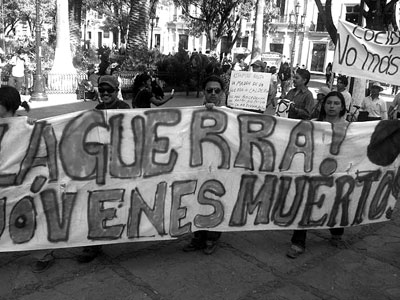
Despite all the government's attempts to suppress and exterminate this "exaggerated idea of freedom," the struggle continues and commitment increases. Here are the latest, unfortunately, negative news from Chiapas in resistance. Thanks for the information the collective Maribel of Bergamo, which consistently translates articles de la Jornada, the Mexican newspaper, the various counter-blog and all the people who volunteer their time, energies and abilities to try to keep alive the voice of the Zapatistas in the world, so that they can continue to exist and resist bad government.
Low intensity warfare
For two decades now, the Zapatistas are trying to carve out a space of self-management autonomy from every point of view, which makes them independent from a bad government that wants them exterminated to speculate on their lands, placing hands on the coveted, lush and beautiful Selva Lacandona, place where even the natives resist and self-manage daily life and political struggle, keeping alive the traditions, a different way to live life, a thought which, with a libertarian implicit tension you feel strongly.
The interests of the government aim for a "renewal" of the area, considered to all effects a biosphere full of untouched flora and fauna, to make it the object of mass tourism, as has already happened with Cancun and the Yucatan peninsula. And to do that, they must permanently delete each seedling of resistance to this plan of death. And so, after the famous Levantamiento of the now distant January 1994 which gave voice to the world spotlight for the first time, this army of natives who declared war on poor governance, resistance and struggle against capitalism, demanding minimum human rights for their survival and need for autonomy on every juncture of their lives that the government has seen fit to begin a long and slow extermination of these desires for freedom and self-management, with more acts of violence, deaths, killings, disappearances, torture but also with a wickedly clever mechanism, named "low intensity warfare" in which the bad government hopes to take out all that remains of a culture based on dignity, respect for others, solidarity, freedom and equality between all human beings. Trying to bribe the same members of the Zapatista support bases, to a family in conflict with each other for a handful of pesos, the creation of teams composed primarily of indigenous paramilitaries themselves, bought and bribed with alcohol and weapons, sporadic actions violent repression against a backdrop of continued threats and intimidation: so the Mexican government has tried to get the Zapatistas resignation.
It's called "low intensity war" and its ingredients are time and terror. Inaugurated by the "strong policy" of the United States at the time of Ronald Reagan and tested with great success in the restoration of the dictatorships of Central and South America (remember for example the bad luck of Nicaragua, torn by the actions of the Somoza "contras"), even Chiapas is bearing fatal fruit. Continuous movement of troops on the rough roads of the most withdrawn, sporadic and bloody actions of the paramilitaries (indigenous groups armed by the government unofficially who sow terror to break the defense against indigenous and peasant) and finally political maneuvering of a staggering banality that demonstrate the full corruption of the institutions. The reality is bitter. The Zapatista revolutionary ideal, although in many ways different from the socialist and communist revolutions in Latin America three decades ago, is in fact suffering the same fate and is fought with the same tools from the forces of neoliberalism. The encirclement of revolutionary politics (because it is primarily a political movement of opinion), pressed on all sides by low-intensity war, is leading to the gradual disintegration of the consent to the revolution in the bands of the early beneficiaries of the revolution itself - the farmers , the indigenous, and with them all the poor and oppressed of the country, that the government wants to silence and subordination. The climate of terror has a result of all these mechanisms has generated within indigenous communities themselves serious disputes and frictions, fed with subtle maneuvers to be trustees of the PRI government. This was followed by the displacement of masses of "desplazados" (refugees): people who leave their homes, farmlands that provide sustenance, relatives and friends. Those who stay must make the best of a bad game, regardless of belief or Zapatista pro-government.
Is the strategy of low intensity warfare: the obstacle of fear and interposing the prospect of a life of hunted between the revolutionary consciousness of the need and manifestations. In other words, cut off the connection between ideals and reality: you know, the imposition of the status quo can fatalistic calm in many cases even the brightest minds. But for now, show us how to follow the news, updates that we receive electronically testify that the will to fight is still so much that their minds are not resigned, despite the pain of loss and poverty and terror they are reduced to living.
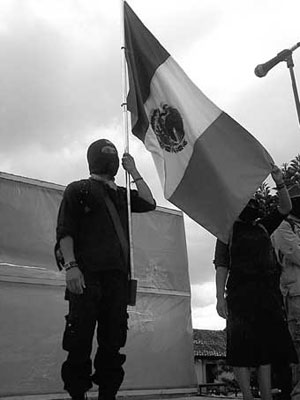
May 8, 2011: Zapatista army, a silent march for peace
In San Cristobal de Las Casas, Chiapas, Mexico, on the afternoon of Saturday, May 8th there was the silent march for peace, which was attended by thousands of Zapatista militants.
The militants have started to arrive early in the morning, about 5.30 to CIDEC, (The University of the earth, a complex of fully self-education and self-built by the Zapatistas in cooperation with other organizations at the foot of the mountains that cradle San Cristobal.) Then begin to walk towards the 14. So they move to the city center, at around 17.30.
As usual, at their side there are many foreigners and other associations and organizations that do not let go this opportunity to demonstrate against the government and to support indigenous peoples in their just protest.
In the most surprising and absolute silence, more than 15,000 supporters of the Zapatista Army of National Liberation (EZLN), according to conservative calculations, have flooded the streets of this city in the reappearance of the public community in rebellion and the state of the Clandestine Committee Revolutionary Indigenous Comandancia General of the EZLN, after more than five years without manifesting outside their territory.
In the keynote speech in front of a square filled with the Zapatistas and the Other Campaign and community organizations in Chiapas, Captain David has expressed a clear position on the war of the EZLN and the different currents: "This is not to see who wins among Catholics, evangelicals, Mormons, Presbyterians or any religion or non-believers. This is not to see who is indigenous and who is not. This is not to see who is richer or poorer. It is not about who is left, center or right. This is not the best if they are PRI or PAN or the PRD, or as they are called or if they are all equally bad. It is not about who's Zapatista or not. This is not to stand with organized crime and disorganized crime with which the bad government stands. No. It is that to be what everyone chooses to be, to believe or not believe, to choose an ideological, political or religious, to discuss, agree or disagree, we need peace, freedom, justice".
Thousands of indigenous people with ski masks from all five regions under the influence of the EZLN (La Realidad, La Garrucha, Morelia and Roberto Barrios and Oventic) arrived by truck from the early hours of the morning. With their faces covered and the discipline that characterizes them, are parties in a row from the Indigenous Centre for Integral Formation (CIDEC), on the outskirts of this city, to the Place of Peace, where they arrived after more than four hours, and when the head the procession arrived in the square, the road to San Juan Chamula, the district of San Ramon, the Puente Blanco, Diego de Mazariegos were filled with the Zapatistas.
The Zapatista army spokesman, Commander David begins his speech: "we are here today, thousands of men, women, children and elders of the EZLN (Zapatista Army of National Liberation) to tell our little word, because noble-hearted people we have called into question, asking us to stop the war that was filled with sadness, grief and indignation for the people of Mexico. We feel called into question by the clamor for justice for the parents of children who were killed by bullets, arrogance and stupidity of the bad governments. Why do we feel called into question by relatives of the dead, wounded, maimed, disappeared, kidnapped and imprisoned without any guilt.
Tens of thousands of people have died in this senseless war that leads nowhere, because there is more peace and justice in every corner of our country, because our only fault to be victims, was to be born or live in a country badly governed by groups of legal and illegal, in time of war, death and destruction this war has had as its main military target, innocent brothers of all social classes, which have nothing to do with the drug trafficking, either by government forces. Why the bad governments have turned into war zones, schools, public and private universities, and for this reason children and young people are not in school, but live in hiding for fear of ambushes. Because the meeting and entertainment venues have also become military targets, because it makes the journey from home to work on foot with the anguish of not knowing what will happen, not knowing if a bullet or criminal misrule is about to pour our blood, that of a relative or a friend's. The bad governments have created the problem, and not only have not solved, but have spread throughout Mexico. Today we are not here to talk about our pain, our struggles and our dreams, our lives and our deaths, we are not here today to highlight ways, or to explain what paths to follow, or to say what to do or to respond the question of what we need, we are here today to represent thousands of indigenous people, much of whom we are today, to shout in a loud voice their demands for justice, the desire for peace, the need for freedom, which include the Zapatistas , share and support.
More than 30 commanders of the EZLN, among them Tacho, Zebedeo, Bulmaro, Guglielmo, Miriam and Ester, have occupied the stage in front of the Cathedral of Peace. From there, Captain David explained that the appeal to national march was founded by people who "are not calling or convincing to embrace a religion, an idea, a thought, political or social position. We are not calling to drive out one government to put another one. We are not saying that we must vote for one or another. These people are calling us to fight for life." It can be life only if we have freedom, justice and peace. Therefore this is a struggle between those who want life and who wants death. In the amazing silence and with thousands of small cards with the words "No more blood," "Enough" and "Stop the War of Calderon," the Zapatistas Tzotzil, Tzeltal, Tojolabal, Choles, and Mames Zoques marched with huge banners with the following messages: "Brothers and sisters, we feel sorrow for the loss of your loved ones, for this cruel war of Calderon" and "Long live the life, liberty, justice and peace."
Finally, after more than 5 hours of mobilization, regardless of the hours used to reach this city, the mistress of ceremonies said: "We said what we had to say. Even though we are tired, that's the struggle. " And the translations in Tzotzil, Tzeltal, Chol and Tojolabal Zapatista told with humor, "we know that you did not understand anything, but we have endured. Thank you for your patience." Then he hailed, "as we came, now we're leaving."
To close, voices shouted in unison: "they are not alone!" And "want to live the life, liberty, justice and peace."
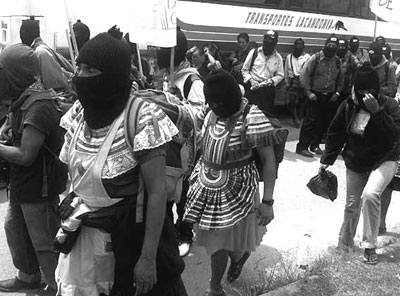
May 10, 2011: Indigenous women argue that governments not only kill with weapons, but with poverty and hunger.
Ideas taken from an article by Hermann Bellinghausen, appeared on the Jornada, the Mexican national newspaper.
"This is no time to be cowards. When there is violence in our country we feel sadness for the people, our family and our community, and sometimes even cry when we know the bad news. Let us angry because we rape and kill us, and governments do nothing, but put the innocent in prison, not the guilty." In a statement addressed to the women of Mexico and the Zapatista Army of National Liberation, some communities Aguacatenango women's collectives, The Grandeza, Napité, Corostik, Coquiteel, Sulupwitz, Frontera Comalapa, Santa Rosa de Coban, Yaluma, Chihuahua, and Bella Vista del Norte, the northern regions, highlands and highlands of the border, all in the state of Chiapas, they argue:
"The earth is with us".
And they add: "Governments do not kill only with weapons but also with poverty, hunger, which they use to deceive us with projects that we are taking the time and firmness, we inculcate their ideas, make sure that we are divided and there organize. We are indigenous, peasant activists and workers, cultivate the earth mother, we sow and care about, and is our respect. Governments and large countries are to take it from us, but we tell them that the land is not sold, it is our mother, we live and we feed her and fight for her. "
They list their demands that include a significant women's right to possess and cultivate the land: "We do not want that our land, or water are privatized by large companies like Coca Cola. We do not want chemicals or GM because they bring diseases. Even projects to cultivate oil palm and pine nuts, because deplete the strength of the earth, damaging our health and do not make us produce more food for the food, but we do produce fuel for cars and then die of hunger. "
They reject the mines, government programs such as the Programa de Derechos de-examination ejidal Solares Urbanos y de Titulación (Proceed), the Programa de-examination Communal de Bienes (Procecom) and the Fondo de Apoyo para los nucleos Agrarios since Regularizar (Fanar) "because mother Earth subtract and divide our communities. "In their broad repudiation, organized indigenous women include alcohol and drugs in their communities, "because it causes violence."
"Our message to governments that it is a lie that there is more poverty. We do not want the military or police checkpoints, control us and make us more violent. They are close to our communities, we are afraid, a lie is that the armies help the people, they rape us and kill us. "Peasants "have no ground, because the bad governments to privatize, consumed by chemicals and monocultures, buy our products cheap, our heart aches, seek other jobs and leave our land because our children are hungry."
Demand justice, no more violence, which recognizes the right of women to property, to the sowing and decision making. "What respect our language and culture and we do not discriminate."
They say that men and women of Mexico: "Do not give in, fight for the land and your land. It is ours, Cultivate, not sell it, defend it.” Called for “fight because only together we have the strength to fight violence and bad governments.” Finally, the “comrades Zapatistas say that thanks to their fight we could see the reality in which we live and why we tell them to take into account women because we are with them, fighting for the same thing and will join forces.”
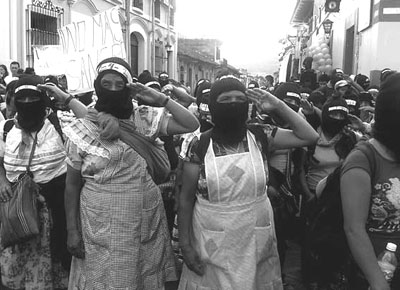
May 11, 2011: Comes the reply the march of San Cristobal. Elements of the Ejército de Dios shoot against bases of the EZLN
The organized Mitzitón people, adherent to the Other Campaign, has denounced attacks and gunfire by elements of the so-called Ejército de Dios during and after the march of the bases of support EZLN and the Other Campaign in the center of San Cristobal de las Casas, Chiapas, on the eighth of May. Faced with the massive mobilization and the Zapatista Other Campaign, say the natives, "the government responds quickly to our demonstration of civil and peaceful organization with the unic way he knows: the violence at the hands of today's paramilitaries, tomorrow its police. " The ejidatarios report that that day joined the National March for Justice and against Impunity, "close to our fellow Zapatista support bases of the five Caracoles adherents to the Other Campaign, 120 men and women went to San Cristobal, the rest of the families remained in the community to carry out their daily activities. "
Around 13 "some companions were grazing sheep on land bordering the Military Zone in Rancho Nuevo 31", when they started shooting at them. "I can see two paramilitary attackers, but they recognized only the son of Robert Perez Vicente, owner of the vehicle used in the paramilitary attack that we have suffered on February 13, and by impunity and complicity of misrule is free even if there is much evidence of the attack and armed with a companion was seriously injured. " Spend 19 on Saturday, "we were driving back from when we heard four explosions." An hour later, "the paramilitaries have fired more shots." The policemen stationed in the community, "said they reported the situation to their commander, but to us they said they were firecrackers." Two attackers were recognized: Andrés Jiménez Hernández Segundo and Pascual Zainé Díaz Jiménez. There was another one, "but we do not know if there were others." At 21, they add, "Gregorio Gómez Jiménez, leader of the paramilitary of the Ejército de Dios, with his pickup truck down the road from his home and the international road, as if searching for some of us. Even now keep the tension and threats. " They recall that on May 3, the local press has published the declaration of the delegate of the Secretariat of Communications and Transport, Ernesto Jáuregui Asomoza, saying the San Cristobal-Palenque highway project "is not dead and that will be realized as the track was" .
Complain: "It must be for this and because they see that we are organized and we are not alone, they want to provoke, torture, repression and murder that we stop defending our territory. The bad government of Felipe Calderón and Juan Sabines should think that in this way we are taken only by fear and defend ourselves from the paramilitaries, but do not forget the reasons for our struggle, our rights as indigenous peoples, the defense of our land and territory and the construction of our autonomy. "
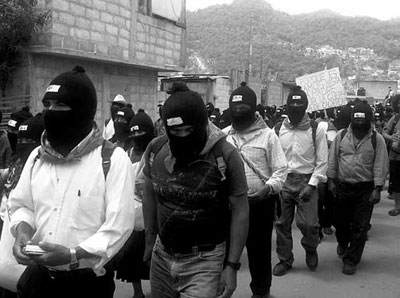
May 12, 2011:vThe "political prisoners" of La Voz dell'Amate and the "prisoners solidarity" ask to be freed
The "political prisoners" of La Voz dell'Amate, members of the EZLN Other Campaign, and the group of "prisoners solidarity" with them, locked everyone in the jail number five of San Cristobal de Las Casas, Chiapas, ask to be freed immediately because their arrest was unjustified.
Alberto Diaz and Rosario Gómez Gómez Patishtán also declared that "the solution of many problems that Mexico is not distressing to increase the salaries of the staff of the Army and then the Federal militarize the country, much less get rid of and kill innocent civilians and oppress the poor people."
"Not worth even stop innocent people." In doing so, President Felipe Calderón "who wants to give the image of a stable country and peace," does the opposite. "Here you see only the human rights violations and impunity in many cases."
Announce that they have united as La Voz dell'Amate "silent march convened by the EZLN to the May 7", with a 12-hour fasting and prayer, "in solidarity with the National March for Justice and against Impunity, is murder of children and the family of Comrade Javier Sicilia that are Juan Sicilia Ortega, Luis Antonio Romero Jaime, Julio César Romero Jaime e Gabriel Alejo Escalera".
They say "stop the war by Calderon, no more blood," and say: "We've had enough of injustice and made arrests for crimes. We ask all of Mexico to stop this war of death and hatred, and demand the release of all political prisoners in the country. "
Professor Alberto Tzotzil Patishtán in prison for more than ten years, not desist from asking for his freedom. The government of Juan Sabines Guerrero has promised to intercede for him with the judicial authorities of the Federation, but three years since the hunger strike which led to the liberation of dozens of "political prisoners", his case is not solved yet.
Now, in addition, there is a new "political prisoners" Zapatista, Patrick Dominguez Vazquez, a peasant of the EZLN autonomous municipality of Tierra y Libertad, a native of the community Monte Redondo, unjustly in prison from April 12 to Motozintla after his house had been burned by pro-government groups backed by the mayor of Frontera Comalapa, David Escobar.
Other inmates of the Other Campaign, the so-called "5 Bachajón" are behind bars since February 3, without giving a sign that Chiapas authorities are going to free them. This is Jerónimo Méndez Guzmán, Alvaro Domingo Perez, Juan Aguilar Guzmán and Domingo García Gómez, Social Reintegration Center State No. 17, Playas de Catazajá, and Mariano Silvano Demeza Juvenile Prison in Villa Crisol, City Hall Berriozábal.
Their defense has shown that they are kept imprisoned as "political hostages", although they are not responsible for the crimes against them.
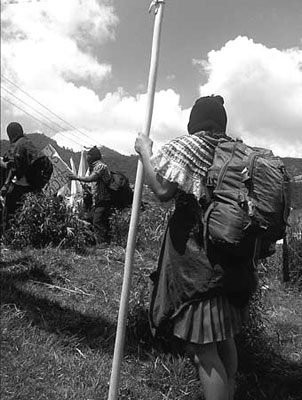
May 20, 2011: World Declaration in Support of Indigenous Tseltales San Sebastian Bachajón members part of the Other Campaign
In Chiapas, investment in tourism infrastructure and, in the logic of "development" through the government Centro Integralmente Planificado Palenque (CIPP) project, which in turn is part of the most ambitious project known as Mesoamerica (formerly known as the Plan Puebla Panama), are now a crucial contest against the construction of alternative lives of indigenous peoples in Chiapas, fighting for years for recognition of their autonomy as peoples within the framework of self-determination, and that in practice they exercise their autonomy process. They are the ones that historically retain their natural resources and territory, in a balance of human and rational relationship. In that struggle for survival lies the strength and civilian ejidatarios of San Sebastián Bachajón (SSB) adherents to the Other Campaign (LOC) in the area of Agua Azul. Peoples who resist in defense of their rights faced by of the neoliberal governments, many actions that are intended to destroy the organization and the work of construction of other possible worlds. Today, the government of Chiapas has arbitrarily arrested and held under constant harassment and threats, 5 ejidatarios San Sebastian Bachajón of l’Altra Campagna all innocent of the crimes they are accused, victims of corrupt Mexican judicial system, which obeys the voice of interests of national and international investments. It serves to suppress and destroy the people, organizations or persons who do not agree with the government's neoliberal interests, interests that are causing havoc and death of those who bet on a life in which human rights to develop and live in fullness.
The latest act of repression faced by ejidatarios past took place on April 9, 2011, when about 800 state police officers of the Preventive Federal Police and military officials have cleared the ejidatarios San Sebastian Bachajón dell’Altra Campagna, which had taken hours before control of the box office entrance to the waterfalls, the same that had been taken from them on February 2 with a plan developed by the government of Chiapas, along with the "pro-government" ejidatarios. The region of Agua Azul is a clear example where the state and federal governments exert the full force of the State for the plundering of the historical territory of indigenous peoples.
For the countless human rights violations committed against the ejidatarios of San Sebastian Bachajón Other Campaign, collectives, committees, movements, social organizations and civil society so we utter (to see the membership to this appeal: http://chiapasbg.wordpress.com/2011/05/20/dichiarazione-mondiale):
- To respect the right to self-determination and the exercise of autonomy of the people of San Sebastian tseltal Bachajón adherent to the Other Campaign, as stipulated in the treaty No.169 on Indigenous and Tribal Peoples in Independent Countries, the United Nations Declaration on the Rights Indigenous Peoples and the San Andrea Accords, Document 1, 3. 1. Document 2, II, IV (2 3..); Document 3.1 (c, d), Document 1, Principle 5 of the new report.
- To respect the right to use and exploitation of natural resources such as indigenous people have preserved over centuries. Right enshrined in the Treaty No.169 on Indigenous and Tribal Peoples in Independent Countries Art. 13.2; United Nations Declaration on the Rights of Indigenous Peoples and the Agreements of San Andrés, B. 1.4 Document 2.; Document 1, Principle 2 of the new report.
- For immediate release: Jerónimo Méndez Guzmán, ejiditarios Other Campaign, Alvaro Domingo Perez, a member of the Commission for the promotion of the Other Campaign, Juan Aguilar Guzman, treasurer of the Other Campaign, Domingo García Gómez, a member of the Defense Committee of Human Rights; Demeza Mariano Silvano, a minor of the Other Campaign.
- For the immediate withdrawal of police and military who keep the area under siege Bachajón ejido of San Sebastian, just access to the beach area of Agua Azul is now run by the state and federal governments.
 Gaia Raimondi
Gaia Raimondi
|

